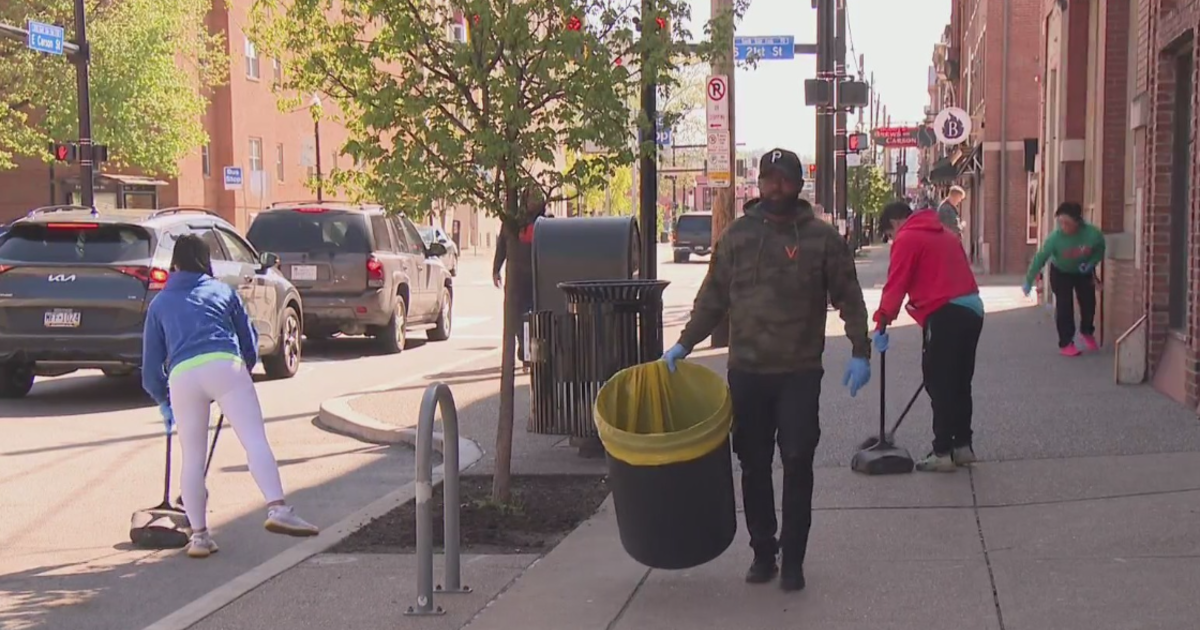Dr. Maroon's "What It Takes To Be An Ironman"
PITTSBURGH (NewsRadio 1020 KDKA) - At 73, Steelers team Neurosurgeon Dr. Joseph Maroon is far from slowing down. In fact, he's gearing up for the 2013 Ironman World Championship Triathlon, a grueling 140.6 mile swim, bike and run in Kona, Hawaii.
How does a man who should be preparing for retirement find the physical and mental power to compete at this level?
KDKA-AM's Larry and John talked to Dr. Maroon about what will be his eighth Ironman competition and how he can do this. In his interview, he said it's about discipline and focus.
"The message is how fantastic the human body is to responding to stress when it's in an incremental fashion," says Dr. Maroon. "If you gradually test your body, stretch your body, it gets stronger. The key is not getting into the red zone of your tachometer on your car, where you burn up your engine and hurt yourself."
Hear more of Dr. Maroon's interview with Larry and John, and read his essay below on his philosophy on life and fitness. Talk about a powerful message!
Dr Joseph Maroon
WHAT IT TAKES TO BE AN IRONMAN
Joseph C. Maroon, MD
"The greatest moments of our lives are when our mind or our body is stretched to its limits in the voluntary pursuit of something both difficult and worthwhile."
-Mihaly Csikszentmihalyi, Flow: The Psychology of Optimal Experience
In 1977 on the Hawaiian island of Oahu, a spirited debate occurred about which athletes were more fit—runners, swimmers, or cyclists. John Collins, a US Navy commander and fitness guru, suggested the debate be settled with a race, to take place in a single day, that combined all three long-distance endurance events already held annually on the island: The Waikiki Rough Water Swim (2.4 miles), the Around Oahu Bike Race (112 miles), and the Honolulu Marathon (26.2 miles). Collins stated, "Whoever finishes first, we'll call him the Ironman." In February 1978, the first Ironman Triathlon took place, and the winner was Gordon Haller, a US Navy communications specialist who finished with a time of 11 hours, 46 minutes, 58 seconds.
A Sports Illustrated journalist wrote a 10-page pictorial account of the race, piquing the interest of athletes worldwide, and the event has since drawn hundreds of thousands of competitors from more than 120 countries. In 1981 it was moved to the Big Island of Hawaii where the strong, gusting crosswinds and the intense heat radiating from the volcanic rock qualifies it as the most punishing of all endurance races.
To be one of the 1,700 annual competitors in the Ironman World Championship Triathlon, athletes must win an age group race or qualify via a lottery. And anyone finishing in less than 17 hours earns the title of "Ironman," regardless of gender. It's the perfect venue to allow athletes to stretch their limits both physically and mentally.
Motivation
What motivates a person to train 20+ hours a week in a test of human endurance that pushes both the mind and body to dangerous extremes? Most say it's to improve their physical and mental conditions. But for me, the motivation came from adversity, and the races now represent a spiritual quest as much as a mental and physical one.
Thirty years ago my father died, my marriage fell apart, and I had to leave my job as a neurosurgeon—all in the same week. My father had bequeathed my mother a dilapidated, debt-encumbered truck stop, so one week I was performing intricate brain surgery and the next I was filling up 18-wheelers and trying to help both my mother and myself survive.
After several months of fighting debilitating depression, a friend invited me for a run around the local high school track. I was terribly out of shape and twenty pounds overweight, but he cajoled me into running four laps with him. Although exhausted, a spark of life returned and that night was the first good night's sleep I'd had in months. I found myself at the track the next day, alone, running 1.5 miles and then 2 miles, then 4, then 6. I felt like Forrest Gump!
It was around this time that I read about cross training and triathlons. I vividly recall watching an ABC's Wide World of Sports special on the college student, Julie Moss, whose body had nearly given out just before the finish line of the race. She crawled to the completion, coming in second, but creating one of the most iconic moments in Ironman history. To compete at that level was an impossibility for me, not even a consideration. But I did sign up for a "Tin Man" race that year (1 mile swim, 25 mile bike and 6.2 mile run). The feeling of accomplishment, the exhilaration and—most importantly—the eradication of my depression enabled me to return to the most fulfilling part of my neurosurgical career.
After that, however, I slowly "raised the bar" in terms of my distance training until finally, in 1993, I qualified for the Hawaiian Ironman World Championship in Kona. Nothing before or since gave me such a feeling of accomplishment. Most importantly, it forced me to become focused, adaptable, flexible, and more efficient in all aspects of my life.
Mental
Others who've completed Ironmans would likely agree that the mental aspect is far harder than the physical. Self-doubt. Being intimidated by others who seem to have iron quads and bionic arms. Extensive highs and lows. Confronting one's own fears. Repeatedly asking, "Tell me again why I'm doing this as well as my 'day job' of neurosurgery?!"
James "Doc" Counsilman, legendary swimming coach at Indiana University, preached to his swimmers, "HURT, PAIN, AGONY!" Yet most athletes, he stated, stop competing or training when they hurt—and as a physician I must say, for good reason! Competitive athletes, however, learn to push through the inevitable pain, and every champion knows what it's like to persevere even when that pain turns into agony.
Learning to handle physical and mental stress is actually a prerequisite to improving physical and mental health, but the Ironman must always be mindful of limits to avoid injury. I use my mind to monitor the stress on my body, just like a tachometer on an automobile; I want to gradually increase the RPMs to go faster and longer, but I want to avoid the red zone at all costs! That is where injuries occur, the immune system becomes suppressed, colds and infections develop, and the "engine" breaks down.
One of the most rewarding aspects of such intense training, though, is the increased sensuality that comes from stretching the body to its limits. Taste, smell, hearing, touch, and vision are all enhanced by purging the body of toxins, both mentally and physically. It's the same evolutionary biological "sharpness" experienced by our ancestors on the African savannah. Calorie restriction (C.R.) or hunger—endemic in them and in triathletes—is the ancient genetic switch that enhances the visual, auditory, olfactory, and tactile senses for survival.
Spiritual
I have been asked what I think about in order to overcome the boredom of swimming laps, riding endlessly on a bike, and running mile after mile. For me the intense training is like the fire used to heat gold ore to extract the pure gold; with the dross removed, I am left with the very essence of mind, body, and spirituality. I find psalms particularly useful in helping me to focus and to suppress the inevitable pain and discomfort.
And when I stand with 1,700 other competitors, waist deep in the surf of the Kona harbor, it's one of the most incredible and spiritual sights I've ever seen. At precisely 7:00 a.m., a cannon booms to start the race just as the sun comes over the rim of Kona Mountain and highlights the spire of St. Peters Church projecting into the sky. At this point I recall the words of David captured over 3,000 years ago in the 121st Psalm:
"I lift up my eyes to the mountains—
Where does my help come from?
My help comes from the Lord, the maker of heaven and earth.
He will not let your foot slip…the Lord is your shade.
The sun will not harm you by day,
Nor the moon by night.
The Lord will keep you from all harm."
Anticipating the heat and winds of the day and knowing that it will take me at least 15 hours to finish under the moon at night, I find these words very consoling. As I struggle on the marathon and my body cries out for respite, the 23rd Psalm, "The Lord is my shepherd I shall not want…" has gotten me through many finishes.
Physical and Nutrition
Being motivated and having a healthy mental and spiritual approach to training simply isn't enough to train for an Ironman, however; preparing and completing the race is one of the most incredible physical challenges in the world. For me it takes a minimum of six to eight months of preparation, starting with a base of 5-7 hours per week of swimming, biking, and running. By August and September, my workouts range from 16-22 hours per week and include an average of 5-7 miles of swimming, 170-250 miles of biking, and running/jogging/walking another 20-40 miles per week.
When I began running around that high school track many years ago, I intuitively knew the fuel I'd been using for my body—fast food burgers, fries, soft drinks, etc.—was like putting bad oil into an engine. I quickly realized that to maintain and accelerate in a physical fitness program, I needed proper fuel and supplements. I essentially "discovered" the Mediterranean diet, which is high in fresh vegetables, fruits, beans, high-quality protein, and avocados, along with healthy fats and good carbohydrates.
In addition, I learned that magnesium is frequently depleted with intense exercising and required additional supplementation. Vitamin D3, CoQ10, L-carnitine, and N-acetylcisteine are all anti-oxidants for added mitochondrial support. D-ribose and creatinine do the same. Protein supplementation with a good-quality whey protein, along with fish oil and resveratrol as natural anti-inflammatories, are also helpful. Proper hydration and calories, particularly as the workouts get longer, must be calculated. The grueling length and harsh conditions of an Ironman triathlon cannot be performed without attention to these details.
Balance
For me, the most challenging aspect of Ironman training has been balancing sport with life. Maintaining a strenuous training schedule while finding time for work, family, and friends was never easy. However, I've realized that I'm never more efficient, defter in my hand-eye coordination, or mentally sharper than when I'm training for such an event. The physiological explanation for this? Simply stated, physical exercise is the strongest stimulus for the release of BDNF—brain derived neurotropic factor. This substance increases brain plasticity and the formation of new brain cells, both of which increase our memory, efficiency, and learning. As long as we maintain a degree of insight into "touching" the family, social, and spiritual sides of our lives, we know the work and the physical activity will take care of themselves.
Stretching our minds and our bodies to their limits—in any endeavor—does indeed provide the most fulfilling and sensual moments of our lives. I am triply blessed to experience this in neurosurgery, in triathlons, and with my family.



